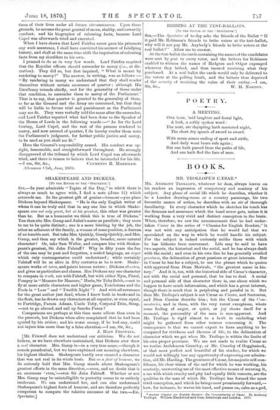SHAKESPEARE AND DICKENS.
(To THE EDITOR OF THE "SPECTATOR.")
Sin,--In your admirable "Topics of the Day," in which there is always so much to agree with, I find a note (June 11) which astounds me. In the greatest gift of genius—humour—you place Dickens beyond Shakespeare. "He is the only English writer of whom it can be truly said that in any one line in which Shake-
speare was not only great, but at his greatest, this other was greater
than he. But as a humourist we think this is true of Dickens." You then cite Mrs. Gamp and Juliet's nurse as parallels ; they seem to me to be quite distinct ; one is a mere hireling by the job, the other an adherent of the family, a woman of some position, a duenna of an humble sort. But take Mrs. Quickly, Gossip Quickly, and Mrs.
Cramp, and then say which is the greater, broader, more natural character? Or, take Sam Weller, and compare him with Shakes- peare's greatest, Sir John Falstaff? Why in fifty years the fun
of the one may be past and forgotten, a sealed language, an argot
which only contemporaries could understand ; while certainly Falstaff will be as alive in fifty centuries as he is now. Shake-
speare works ab intra, and paints human nature ; Dickens ab extra, and gives us particulars and classes. Has Dickens any one character to compare in truth, not with Falstaff, but with either Nym, Pistol,
Pompey in "Measure for Measure," Maria, Sir Toby Belch,—not to fly at more subtle characters and higher game, Touchstone and the Fools in " Lear " and "Twelfth Night "? And with all reverence for the great author just dead, whom I knew both in books and in the flesh, has he drawn any characters at all superior, or even equal, to Partridge, Parson Adams, Uncle Toby, Corporal Trim, Strap, —not to go abroad, and call up Sancho Panza ?
Comparisons are perhaps at this time more odious than even in the proverb, but Dickens when alive complained that he had been spoiled by his critics ; and his worst enemy, if he had any, could not injure him more than by a false elevation.—I am, Sir, &c.,
J. HAIN FRISWELL.
[Mr. Friswell does not understand our criticism. We do not believe, as we have elsewhere maintained, that Dickens ever drew a real character. Mrs. Gamp is—in a very true sense,—though it sounds paradoxical, but we have explained our meaning elsewhere, his highest idealism. Shakespeare hardly ever created a character that was not real in its whole basis. But as a feat of humour, we do seriously hold that Mrs. Gamp stands above Shakespeare's greatest efforts in the same direction,—even, and no doubt that is an enormous even,'—even Sir John Falstaff. Whether or not Mrs. Gamp may be unintelligible to posterity seems to us entirely irrelevant. We can understand her, and can also understand Shakespeare's highest feats of humour, and are therefore perfectly competent to compare the relative successes of the two.—En. Spectator.]






























 Previous page
Previous page